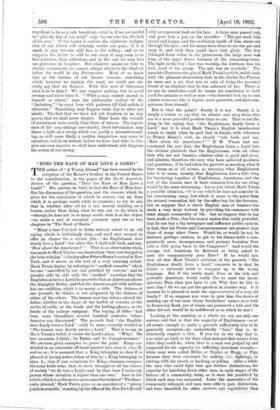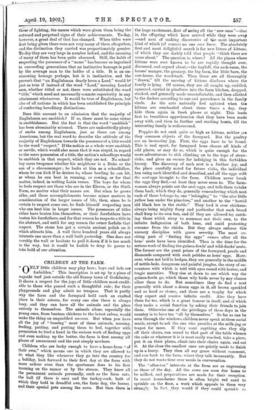"DOES THE RACE OF MAN LOVE A LORD ?"
THE author of "A Tramp Abroad" has been moved by the reception of the Kaiser's brother in the United States to the consideration, in the pages of the North American Review, of the question, " Does the Race of Man Love a Lord ? " His answer, in brief, is that the Race of Man does. But his discussion of the question, and the reasons which he gives for the conclusion at which he arrives, run on lines which it is perhaps worth while to examine; to try to see, that is, whether after all he is not merely insisting on a truism, rather than doing what he sets out to do, which is —though he does not in so many words state it as his object —to make a sort of marginal comment upon one or two chapters in "The Book of Snobs."
"Many a time I've bad to listen without retort to an old saying which is irritatingly true, and until now seemed to offer no chance for a return jibe : An Englishman does dearly love a Lord': but after this I shall talk back, and say, How about the Americans ? " That is an observation which was made to Mark Twain—an observation "that was charged to the brim with joy"—the day after Prince Henry's arrival in New York, and it serves as the text of a very amusing article. Mark Twain begins by referring to "ossified remarks" which become " sanctified by use and petrified by custom," and he parades side by side with the " ossified " assertion that the Englishman loves a Lord the proverbs that an American adores the Almighty Dollar, and that the American girl with millions has one ambition, which is to marry a title. The dulness of one proverb, he thinks, is not surpassed by the dulness of either of the others. The human race has always adored the dollar, whether in the shape of the hatful of cowries, or the zariba of cattle, or the beads and the looking-glasses, or the bonds of the railway company. The buying of titles " had been worn threadbare several hundred centuries before America was discovered." The proverb that " the English- man dearly loves a Lord" could be more correctly worded as "The human race dearly envies a Lord." That is to say, in Mark Twain's belief, it envies the Lord's place. "Why? On two accounts, I think; its Power and its Conspicuousness." We are then given examples to prove the point. Kings are divided in an admirable off-hand manner into class A, class B, and so on; it is assumed that a King belonging to class B is pleased at having notice taken of him by a King belonging to class A; that if you substitute for Kings chimney-sweepers the same holds true; that, in short, throughout all the classes of Society " we do love a Lord—and by that term I mean any person whose situation is higher than our own." Last in his article, which is as discursive as becomes the writer of "The Inno- emits Abroad," Mark Twain gives us an anecdote of a "greasy youth in overalls," standing by the office of the New York Herald
with an expectant look on his face. A large man passed out, and gave him a pat on the shoulder. " The pat made him proud and happy, and the exultation inside of him shone out through his eyes; and his mates were there to see the pat and envy it, and wish they could have that glory. The boy belonged down cellar in the press-room, the large man was king of the upper floors, foreman of the composing-room- The light in the boy's face was worship, the foreman was his lord, head of his group. The pat was an accolade." The anecdote illustrates the gist of Mark Twain's article, which ends with the pleasant observation that in the Jardin des Plantes he once saw a cat that was so vain of being the pemonal friend of an elephant that he was ashamed of her. There is no one, he concludes—and he means his conclusion to hold good for animals as well as men—who does not look up to and admire some one who is higher, more powerful, and more con- spicuous than himself.
But is that the point Surely it is not. Surely it, is simply a truism to say that we admire and envy those who are in a more powerful position than we are. That is not the sting in the saying that "the Englishman dearly loves a Lord," nor is it what Mark Twain's English interlocutor meant to imply when he said that in future, with reference to Prince Henry's visit, he should " talk back, and say, How about the Americans ? ' " If M Twain had not construed the saw that the Englishman loves a Lord into the obvious platitude that the Englishman, with all other men who are not lunatics, admires what is good and great, and admires, therefore, the men who have achieved goodness and greatness; if he had taken the proverb as meaning what it does mean, or, at all events, as meaning what Englishmen take it to mean, namely, that Englishmen love a title, then his bracketing together of Englishmen, Americans, and the rest of the human race in their common love for one thing would be far more interesting. Let us put before Mark Twain a possible situation,—it is one which he does not consider in his entertaining essay, but which is more to the point than the natural veneration felt by the office-boy for the foreman. Let us suppose that a clever English man of business has made a very large fortune by providing his customers with some simple commodity of life. Let us suppose that he has been made a Peer, that his money makes him really powerful, that he can buy a big newspaper and influence public opinion, in fact, that his Power and Conspicuousness are greater than those of many other Peers. Would he, or would he not, be desirous, perhaps anxious, to get to his dinner-table a com- paratively poor, inconspicuous, and perhaps brainless Peer with a title going back to the Conqueror ? And would the average rich American be flattered at being asked to meet the comparatively poor Peer ? If he would not, then all that Mark Twain's criticism of the proverb, " The Englishman dearly loves a Lord," amounts to is that he thinks a universal truth is wrapped up in the wrong language. But if the newly made Peer, or the 'rich and powerful American, would really like to meet the incon- spicuous Peer, then you have to ask, Why does he like to meet him ? Or we can put the question in another way. Is it because he is pleased to meet the representative of a very old family? If so, suppose you were to give him the choice of meeting one of two men whose forefathers' names were both in Domesday Book, yet of whom one possessed a title and the other did not, would he be indifferent as to which he met ?
Looking at the question as a whole, we can see only one answer, and that is that the majority of Englishmen—or at all events enough to make a proverb sufficiently true to be generally accepted—do undoubtedly " love," that is, in- stinctively respect, a 'title. If you try to see why that is, you must go back to the days when men got their navies from what they could do; when, that is, a man was judged by and respected for his capacity for inflicting trenchant wounds,— when men were called Miller, or Taylor, or Hogg, or Pigg because they were renowned for milling (i.e., fighting), or cutting with the sword, or hacking, or piking. After a while, the men who could fight best got further distinctions, the capacity for knocking down other men, in early stages of the history of a community, being as it were the yardstick by which each man was measured. Later the necessities of the community enlarged, and men were able to gain distinction, and were ennobled, for other services and capabilitie-, than
those of fighting, the names which were given them being the outward and perpetual signs of their achievements. To-day, however, a great deal of that has changed. When titles were first being given there were not very many of them altogether, and the distinction they carried was proportionately greater. To-day they are very large in number indeed, and the meaning of many of them has been quite obscured. Still, the habit of respecting the possessor of a " name" has become so ingrained in succeeding generations that an instinctive homage is paid by the average man to the holder of a title. It is an un- reasoning homage perhaps, but it is instinctive, and the proverb that "an Englishman dearly loves a Lord." would be just as true if instead of the word "Lord," meaning Lord of men, whether titled or not, there were substituted the word "title," which need not necessarily connote superiority in any attainment whatsoever. It would be true of Englishmen, but also of all nations in which has been established the principle, of conferring hereditary distinctions.
Does this amount to an admission that the majority of Englishmen are snobbish? If so, there must be some virtue in snobbishness. But the fact is that the word "snobbish" has been abominably misused. There are undoubtedly plenty of snobs among Englishmen, just as there are among Americans, but the real word to describe the attitude of the majority of Englishmen towards the possessor of at title would be the word " respect." If the nation as a whole were snobbish or servile, which would also mean that it was stupid, in regard to the mere possession of a title, the nation's schoolboys would be snobbish in that respect, which they are not. No school- boy cares twopence whether his neighbour is a Duke or the son of a cheesemonger ; he looks at him as a schoolfellow, whom he can kick if he desires to, whose bowling he can hit, or whom he can beat in running, or rowing, or for that matter, indeed, in writing Latin verses. The boys for whom he feels respect are those who are in the Eleven, or the Sixth Form, no matter what their names are. But when be grows older, and these accomplishments become minor matters in consideration of the larger issues of life, then, since he is certain to respect some one, he finds himself respecting men who can beat him in larger issues. The possessors of titles either have beaten him themselves, or their forefathers have beaten his forefathers, and for that reason he respects a title in the abstract, and until for any reason the owner forfeits that respect. The stone has got a certain ancient polish on it which attracts him. A wall three hundred years old always interests one more than a wall built yesterday. One does not worship the wall or hesitate to pull it down if it is too much in the way, but it would be foolish to deny its power to take hold of our attention.











































 Previous page
Previous page